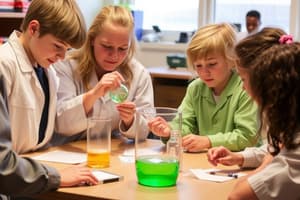Podcast
Questions and Answers
What do science process skills primarily enable individuals to do?
What do science process skills primarily enable individuals to do?
- Conduct artistic experiments
- Analyze historical events
- Engage in scientific inquiry and exploration (correct)
- Memorize scientific facts
Which type of observation relies on using measuring tools and provides precise data?
Which type of observation relies on using measuring tools and provides precise data?
- Descriptive observation
- Casual observation
- Qualitative observation
- Quantitative observation (correct)
Which of the following is a characteristic of qualitative observations?
Which of the following is a characteristic of qualitative observations?
- They are primarily focused on statistical analysis.
- They rely on individual perceptions. (correct)
- They involve numerical measurements.
- They depend on objective data.
What is an example of a quantitative observation?
What is an example of a quantitative observation?
Which of the following statements about qualitative observations is correct?
Which of the following statements about qualitative observations is correct?
How do quantitative observations contribute to scientific analysis?
How do quantitative observations contribute to scientific analysis?
What is a key difference between qualitative and quantitative observations?
What is a key difference between qualitative and quantitative observations?
Which process is a fundamental part of engaging in scientific inquiry?
Which process is a fundamental part of engaging in scientific inquiry?
What is the main purpose of qualitative observation in scientific study?
What is the main purpose of qualitative observation in scientific study?
Which tool is primarily used to measure the mass of an object?
Which tool is primarily used to measure the mass of an object?
How do observations contribute to the scientific method?
How do observations contribute to the scientific method?
What does a graduated cylinder measure?
What does a graduated cylinder measure?
Which measuring tool is best suited for measuring temperature changes?
Which measuring tool is best suited for measuring temperature changes?
Why is measurement considered a fundamental skill in scientific investigations?
Why is measurement considered a fundamental skill in scientific investigations?
Which of the following instruments is used to measure the acidity or alkalinity of a solution?
Which of the following instruments is used to measure the acidity or alkalinity of a solution?
What is the primary function of a meter stick in scientific measurements?
What is the primary function of a meter stick in scientific measurements?
What distinguishes an observation from an inference?
What distinguishes an observation from an inference?
Which of the following statements best illustrates the importance of inference in scientific inquiry?
Which of the following statements best illustrates the importance of inference in scientific inquiry?
How do inference skills contribute to problem-solving in science?
How do inference skills contribute to problem-solving in science?
Which of the following is NOT a benefit of developing inference skills in science?
Which of the following is NOT a benefit of developing inference skills in science?
In which situation would an inference be most commonly used?
In which situation would an inference be most commonly used?
What is the primary function of a colony counter?
What is the primary function of a colony counter?
Which instrument is specifically designed to measure small electric currents?
Which instrument is specifically designed to measure small electric currents?
Why is precision and accuracy important in scientific measurements?
Why is precision and accuracy important in scientific measurements?
What does a voltmeter measure?
What does a voltmeter measure?
Which of the following describes a calorimeter?
Which of the following describes a calorimeter?
What role does inferring play in scientific observation?
What role does inferring play in scientific observation?
Which instrument measures the heat generated or absorbed in a chemical reaction?
Which instrument measures the heat generated or absorbed in a chemical reaction?
What is the main purpose of laboratory sensors?
What is the main purpose of laboratory sensors?
Flashcards are hidden until you start studying
Study Notes
Science Process Skills
- Fundamental abilities vital for scientific inquiry and exploration.
- Serve as building blocks for scientific thinking and problem-solving.
- Involve observing, measuring, and inferring to understand natural phenomena.
Observing
- Two primary types of observations: quantitative and qualitative.
- Quantitative Observation:
- Involves measurement with numerical values.
- Characteristics include objectivity and precision.
- Enables comparisons and statistical analysis.
- Example: Measuring table length as "2 meters."
- Example: Recording water temperature as "25 degrees Celsius."
- Qualitative Observation:
- Utilizes the five senses for information gathering.
- Characteristics include subjectivity and descriptiveness.
- Example: Describing a flower color as "bright red."
- Example: Noting rock texture as "smooth" or "rough."
Importance of Observation in Science
- Foundation for hypotheses, theories, and scientific explanations.
- Enables data collection, identification of patterns, and predictions.
- Both types of observations are essential for a comprehensive understanding of phenomena.
Measuring
- Measurement is a fundamental skill for quantifying and comparing properties of matter.
- Common tools used in scientific investigations include:
- Platform Balance: Measures mass with standardized weights.
- Graduated Cylinder: Measures liquid volume with markings.
- Meter Stick: Measures length, marked in centimeters and millimeters.
- Thermometer: Measures temperature, usually filled with mercury or alcohol.
- Beaker: Versatile container for mixing and holding liquids.
Basic Modern Laboratory Measuring Tools
- pH Meter: Measures acidity/alkalinity with a glass electrode.
- Colony Counter: Aids in counting bacterial/ fungal colonies.
- Calorimeter: Measures heat changes in processes.
- Galvanometer: Measures small electric currents.
- Voltmeter: Measures electrical voltage.
- Oscilloscope: Visualizes electrical signals over time.
- Micropipette: Measures small liquid volumes accurately.
Importance of Measuring in Science
- Ensures precision and accuracy, reducing experimental errors.
- Facilitates comparisons between variables and conditions.
- Supports advancements in innovation and technology.
- Essential for safety, particularly in chemical handling.
- Vital for monitoring environmental changes.
Inferring
- A cognitive process involving logical deductions based on evidence and observations.
- Combines what is seen with prior knowledge to make generalizations.
Importance of Inference in Science
- Enhances critical thinking, leading to a deeper understanding of concepts.
- Integral to scientific inquiry, aiding in hypothesis generation and data conclusions.
- Enables problem-solving by connecting observations with logical solutions.
- Transferable skills applicable in various disciplines and everyday decision-making.
Observing vs Inferring
- Observation: Direct information obtained through senses, e.g., "The sky is cloudy."
- Inference: Logical conclusion drawn from observations, e.g., "It is going to rain."
Studying That Suits You
Use AI to generate personalized quizzes and flashcards to suit your learning preferences.




